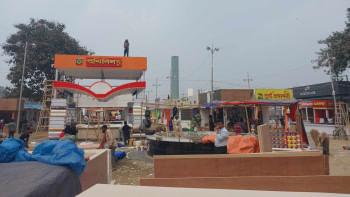Tomorrow’s filmmakers join hands today

Eight-year-old Mubasshira Ibnat had a blast at the 13th International Children’s Film Festival Bangladesh (ICFFB) this week. As a delegate, she attended all seven days of the festival, which started last Friday and ended yesterday. Every day, she came to the main venue at Shahbagh’s Shawkat Osman Hall all the way from Mirpur-2. This is no problem for her though -- she’d rather not be anywhere else.
She didn’t come to the festival alone. Her merry band of three included herself, her father Md Zillur Rashid Khan, and her nine-year-old cousin Mir Ragib Tajwar, whose travels were even more gruelling as he came from Uttara.
Mubasshira and Ragib weren’t just there to enjoy the films. They’re filmmakers who made a stop-motion short film titled “Boon is Missing”, with a runtime of three minutes and 12 seconds. They even got an award for it! While this reporter was talking to them, festival advisor Shajib Jaman came along and gave them their special award certificate. “Wow, we just got a free certificate,” Mubasshira exclaimed.
The cousins started coming to the festival since its 11th edition, serving as auditorium volunteers. In 2019, they saw a film and decided to make one themselves.
The energy of Mubasshira and Ragib’s resonated through the festival. Besides the 52 delegates, around 20-25 of the volunteers have made films in the past, and almost everyone has an interesting origin story.
This year, the festival screened 179 films from 39 countries across five venues: at Public Library’s Shawkat Osman Hall, Sufia Kamal Auditorium of National Museum, Alliance Francaise Dhaka, Bangladesh Shilpakala Academy and Goethe-Institut.
A total of 150 volunteers worked behind the scenes, of whom around 50 were aged below 12, festival advisor Shajib said. The volunteers took care of everything, from auditorium and jury duties to film projection and even food. Running daily bulletins; publishing an illustrated cine-magazine called “Storyboard” -- a serious publication, as dubbed by its editor and cartoonist Mahtab Rashid; organising press and media teams -- they pulled out all the stops.
This is markedly different from the situation in Europe. “What we have over in Europe is festivals organised by adults for the children. It’s inspiring to see how it’s done here,” said Boris Bakal, a filmmaker from Croatia attending the event.
This was Boris’ first sojourn to Bangladesh. “I had only heard of your country, and very little of it. The people are quite daring and expressive,” he said.
“It would be great if you could develop some infrastructure for films, set up film schools and arrange technical training,” he added. This is important for Boris, a film educator first and then a filmmaker. He came to know of the festival through European Children’s Film Association, of which ICFFB is a member.
This year, for the first time, a female festival director arranged the event and led the team. Director Fariha Jahin Biva first came to the festival when she was in eighth-grade. She met Muhammad Zafar Iqbal back then and instantly fell in love with the place, becoming a volunteer for the 10th festival. “I’m not a filmmaker, but I really love films. I feel like it’s the most powerful medium. Its resonance is sharp, capable of overwhelming someone. Though I don’t make them, I want everyone to watch them,” she said.
It wasn’t all smooth-sailing though. “As a first timer, of course I’d make some mistakes, but there were issues that were harder to deal with.”
She was referring to the Election Commission’s assignment of festival premises as a voting centre for today’s city corporation polls. As polling officials walked in with mock voting materials midway through the festival, organisers had to compromise space, vibe, screening, and even schedule for them.
Of her experience, Biva said, “It’s not like a female director is going to be the best director ever. It’s more about how everyone has a different flavour to offer. While previous directors were known for their precise management, I think I made the entire team feel more at home, which is an indispensable part of organisation too.”
“Everything has been awesome for me, although there were a few speedbumps related to my gender. I hope things get better over time,” she bemoaned, though not without optimism.
It was probably because it’s quite easy to feel optimistic when one is at the festival grounds. When college student Bivayon Chakma won the best film award in the coveted under-18 category, he could barely keep it to himself.
“I made this at my native home in Rangamati, facing a lot of difficulties. From resources to navigating the difficult terrains of Rangamati, it was draining. But when I go back home with this [the award]…Even I don’t know what it’s going to be like,” an elated Bivayon said.
He made his film “Badha” on a budget of around Tk 6,000. It revolves around a cash-strapped Chakma family struggling to adopt to modern technology and lifestyle. The story was written by Sachinda Chakma, a veteran local writer from Rangamati.
“This is very important for me, especially given where I come from,” Bivayon said, and this thought was echoed by Biva. “It’s such an amazing culture. It’s imperative that we don’t confine this to the capital only and take it to all the districts of the country and get everyone on board,” she said.


 For all latest news, follow The Daily Star's Google News channel.
For all latest news, follow The Daily Star's Google News channel. 



Comments